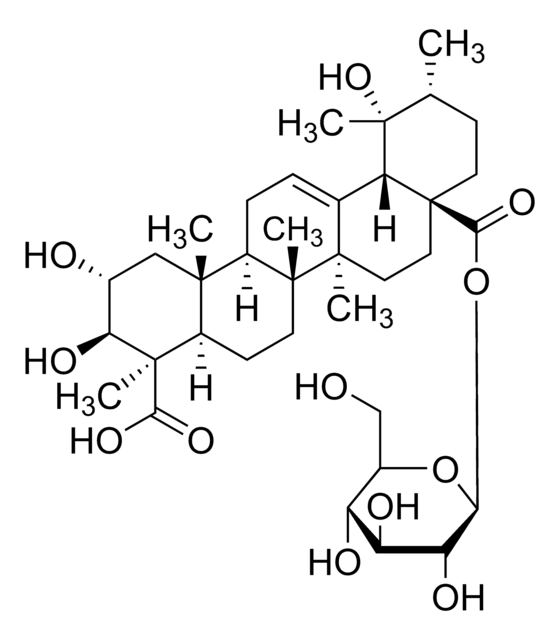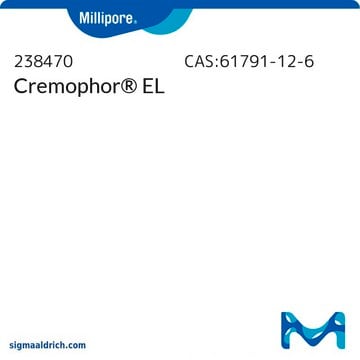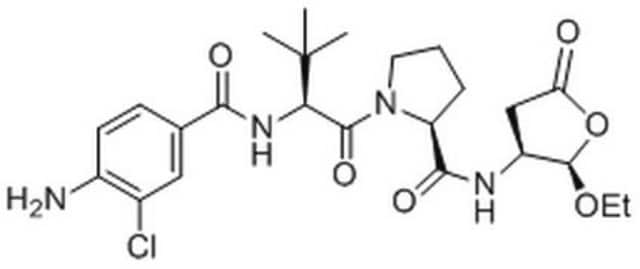Kluczowe dokumenty
SMB00376
CDDO Methyl Ester
≥98% (HPLC)
Synonim(y):
2-Cyano-3,12-dioxo-oleana-1,9(11)-dien-28-oic acid methyl ester, Bardoxolone Methyl, CDDO-Me
Wybierz wielkość
726,00 zł
Wybierz wielkość
About This Item
726,00 zł
Polecane produkty
Poziom jakości
Próba
≥98% (HPLC)
Formularz
powder
Zastosowanie
metabolomics
vitamins, nutraceuticals, and natural products
temp. przechowywania
−20°C
ciąg SMILES
CC1(C)CC[C@]2(C(OC)=O)CC[C@@]([C@@]3([H])[C@]2([H])C1)(C)[C@]4(C)CC[C@@]5([H])C(C)(C)C(C(C#N)=C[C@]5(C)C4=CC3=O)=O
InChI
1S/C32H43NO4/c1-27(2)11-13-32(26(36)37-8)14-12-31(7)24(20(32)17-27)21(34)15-23-29(5)16-19(18-33)25(35)28(3,4)22(29)9-10-30(23,31)6/h15-16,20,22,24H,9-14,17H2,1-8H3/t20-,22-,24-,29-,30+,31+,32-/m0/s1
Klucz InChI
WPTTVJLTNAWYAO-KPOXMGGZSA-N
informacje o genach
human ... IKBKB(3551) , KEAP1(9817) , NFE2L2(4780) , PPARG(5468)
Powiązane kategorie
Opis ogólny
Zastosowanie
Działania biochem./fizjol.
Kod klasy składowania
11 - Combustible Solids
Klasa zagrożenia wodnego (WGK)
WGK 3
Temperatura zapłonu (°F)
Not applicable
Temperatura zapłonu (°C)
Not applicable
Wybierz jedną z najnowszych wersji:
Certyfikaty analizy (CoA)
Nie widzisz odpowiedniej wersji?
Jeśli potrzebujesz konkretnej wersji, możesz wyszukać konkretny certyfikat według numeru partii lub serii.
Masz już ten produkt?
Dokumenty związane z niedawno zakupionymi produktami zostały zamieszczone w Bibliotece dokumentów.
Klienci oglądali również te produkty
Active Filters
Nasz zespół naukowców ma doświadczenie we wszystkich obszarach badań, w tym w naukach przyrodniczych, materiałoznawstwie, syntezie chemicznej, chromatografii, analityce i wielu innych dziedzinach.
Skontaktuj się z zespołem ds. pomocy technicznej










